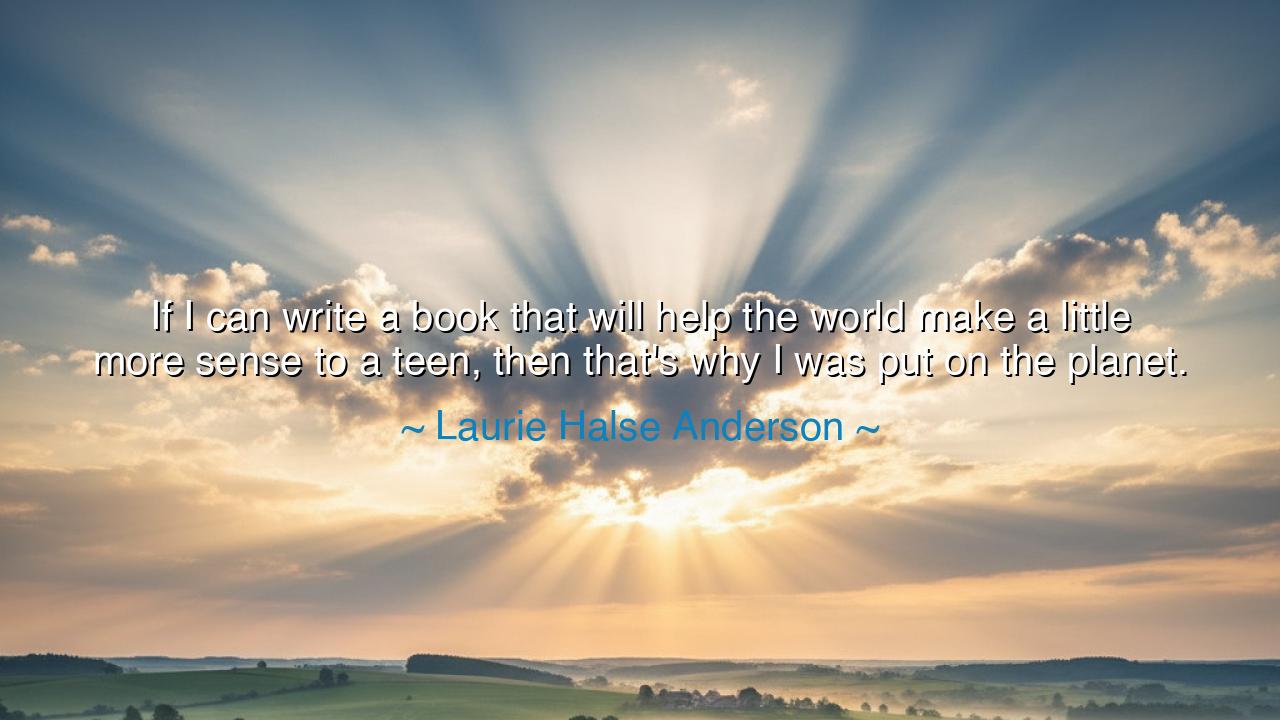
If I can write a book that will help the world make a little
If I can write a book that will help the world make a little more sense to a teen, then that's why I was put on the planet.






Hear now the words of Laurie Halse Anderson, a weaver of stories, who declared with conviction: “If I can write a book that will help the world make a little more sense to a teen, then that’s why I was put on the planet.” This is no idle sentiment, but a proclamation of purpose, a vow that one’s life is to be measured not in wealth or fame, but in the clarity and healing given to the young. For to aid a soul in its most fragile season is among the noblest tasks, and to bring light to a mind in shadow is to serve the eternal good.
The meaning of this saying lies first in the recognition of the teen. Adolescence is not a gentle meadow, but a wilderness filled with questions, fears, and confusions. The young stand at the threshold of identity, no longer children yet not fully adults, buffeted by forces they do not yet understand. To them, the world often seems cruel, chaotic, and overwhelming. Anderson declares that her sacred task is to offer books as lanterns in that wilderness, to help youth see their path more clearly and to know they are not alone in their struggles.
The origin of these words can be traced to the tradition of storytellers throughout history. From the elders around the fire to the prophets, poets, and novelists of later ages, the greatest purpose of stories has not been mere entertainment, but guidance. Homer told of heroes so that the Greeks might learn courage. Aesop spoke through fables so that children might learn wisdom. In the same spirit, Anderson writes for those at the crossroads of youth, believing that words have power not only to reflect the world, but to explain it, to soothe it, to make it endurable.
Consider the life of Anne Frank. A teenager herself, she took pen to paper not with the thought of saving the world, but of making sense of her own. Yet her diary became a testament across generations, helping millions to understand both the cruelty of war and the indestructible strength of hope. Anne Frank did not live to see her words change the world, but her writing accomplished what Anderson aspires to: giving a teen a voice that guides not only herself but countless others.
There is also humility in Anderson’s words. She does not claim to have been placed on the planet to command armies or amass power. She claims instead a gentler, yet perhaps greater calling: to write a single book that makes life clearer for even one youth. This is wisdom, for the worth of a life is not measured in monuments, but in the lives touched and the hearts uplifted. A quiet book read in solitude may shape a destiny as surely as thunder shapes mountains.
The lesson for us, then, is that purpose lies not in grandeur but in service. Each of us may ask: what can I do that makes the world more bearable for another? Some may heal bodies, some may build shelters, some may simply listen to a weary friend. For Anderson, it is to write a book, but for each of us, the calling may differ. What matters is that the task, however small it seems, is done with devotion to others.
Therefore, let us act with courage and tenderness. Let us seek not only our own advancement, but the uplift of those who come after us. Let us remember that the teen, struggling to make sense of the world, needs guides, mentors, and lights along the way. And let us live so that when our days are done, we too may say: “That was why I was put on the planet”—not to conquer, not to consume, but to help others find clarity, hope, and strength on their journey.






AAdministratorAdministrator
Welcome, honored guests. Please leave a comment, we will respond soon